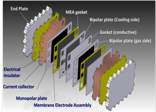 The research line relating to fuel cells is one of the first activities established at the ITAE. The activity in this field started in 1982 with the study of molten carbonate cells. Since 2009 they have no longer been ITAE’s object of study.
The research line relating to fuel cells is one of the first activities established at the ITAE. The activity in this field started in 1982 with the study of molten carbonate cells. Since 2009 they have no longer been ITAE’s object of study.
Fuel cells are electrochemical devices able to generate electric and thermal energy using a fuel without producing fire (go into), yet ITAE employs the following technologies:
- Polymer Electrolyte Fuel Cells (PEFC): they operate at a temperature range varying from room temperature to 100°C and are characterised by polymer electrolyte. Usually, they are hydrogen and air fed.
- Direct Alcohol Fuel Cells (DAFC): they are PEFC that are alcohol fed (methanol and ethanol), and, usually, they operate at a temperature that is lower than 60°C.
- Solid Oxide Fuel Cells (SOFC): they are fuel cells that operate at a temperature that is higher than 700°C and use solid-oxides-based ceramics as electrolytes and structural supports for the electrodes.
- System engineering, testing, and field trials for any and all the Fuel Cells technologies. This activity aims at carrying out technology transfer towards industry, defining (safety, quality, and performance) regulations, spreading information to the audience, and training technicians and researchers.
